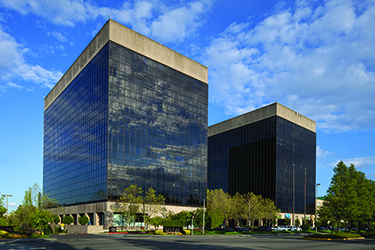SEATTLE—Local commercial real estate firm Urban Renaissance Group LLC and real estate investment firm Iron Point Partners LLC recently sold the 548,704-square-foot SeaTac Office Center to a partnership between San Francisco-based PCCP LLC and URG. The price was undisclosed.
As part of the sale, URG will recapitalize and invest with PCCP at SeaTac Office Center with plans to expand tenant amenities and improve common areas. These efforts seek to differentiate SeaTac Office Center as one of the top office assets in the Southend. URG and IPP purchased the campus in October 2015 at 62% occupancy and made significant investments in the asset including adding new amenities, upgraded cosmetic materials, updating and adding conference rooms, expanding the fitness center, upgrading building systems, and making exterior improvements.
These investments returned the asset to class A and as a result, more than 90% of tenants renewed leases since 2015. Currently more than 94% occupied, tenants include Alaska Airlines, Lynden, TSA, the Port of Seattle and 13 Coins.
The property is located at 18000 Pacific Highway South across from the Seattle Tacoma International Airport and within walking distance of the SeaTac/Airport Link light rail station.
“Given the great location of this asset, and significant office rent increases in the Seattle/Bellevue markets, there is continued and growing demand for office space near the airport and light rail. URG was very interested in remaining in ownership,” said URG founder and chief executive officer, Patrick Callahan. “We’re also very pleased to be reinvesting in this asset with PCCP.”
Built between 1974 and 1980, the three-building complex includes two 12-story North and South Towers at 225,000 and 215,000 square feet each, and a four-story 110,000-square-foot low-rise building.
“At Urban Renaissance Group, we are committed to investing in great locations and buildings with tremendous potential, and SeaTac continues to be an exceptionally well-served location in terms of public transit and proximity to the rapidly expanding SeaTac airport,” Callahan tells GlobeSt.com. “As demand for institutional-quality high-rise campuses in the south-end of Seattle grows, we believe this project achieves our primary goal of working toward developing a vibrant future for cities, towns and neighborhoods.”
New York-based Newmark Knight Frank was the investment sales broker representing the seller. NKF’s co-head of US capital markets Kevin Shannon, vice chairman Nick Kucha, senior managing director Michael Moll, and directors James Childress and Bill DeLacy represented URG and IPP.
“The Southend market of Seattle is seeing renewed positive momentum,” said Kucha. “We are continuing to see office tenant migration from the central business district and the Eastside to lower cost alternatives. At the same time, transit-oriented office projects like SeaTac Office Center are the first to benefit. With ample onsite parking and the Link light rail connecting directly to the Seattle CBD, tenants can easily get to and from downtown.”
Shannon says URG’s repositioning and location were key in the disposition.
“URG successfully repositioned this asset by enhancing the common area amenities, increasing occupancy and lease term, and improving the terms of the ground lease,” said Shannon. “They were able to capitalize on the inherent demand from airport office users as well as tenants migrating from higher rent markets like Seattle.”
The Puget Sound office market continued to surge in the second quarter, with average asking rents increasing to $38.79 per square foot, up 4.4% compared with the first quarter, according to a second quarter office report by NKF.
Overall vacancy in the region dropped to 7.6%, down 50 basis points from the previous quarter and down 180 basis points year-over-year. There was 1.47 million square feet of net absorption in the quarter, and the ongoing construction boom delivered 980,449 square feet of new class-A office product. Leasing activity was strong, up more than 1 million square feet compared with the first quarter, largely because of massive leases signed by technology companies in the Seattle central business district, Lake Union and Bellevue CBD submarkets, according to the report.
